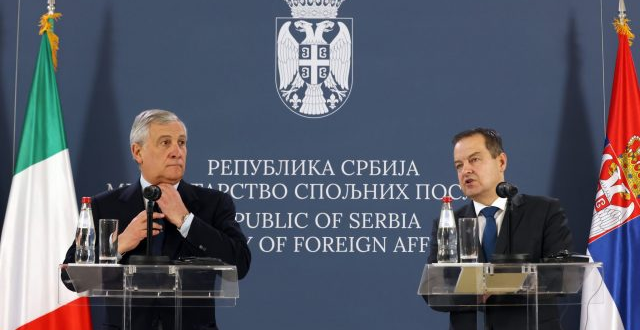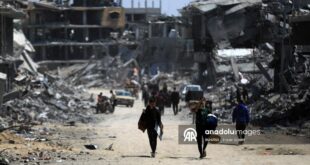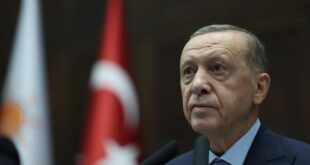A concern that Italy is not adequately exploiting its assets in the Balkans has again started to agitate Italian politicians.
According to Dario D’Urso, a contributor to the CeSPI report, Italy played a leading role in the Balkans in the 1990s and early 2000s thanks to bilateral relations and multibilateral endeavours.
However, its influence in the region was weakened because the country relied on an EU enlargement process that did not bring timely results.
With the exacerbation of relations between Serbia and Kosovo in the last months, Italian journalists want to know what Italy should do not only as a member of the EU but as a single state.
During a Q&A hosted by the magazine Limes on YouTube, Alessandro Polity, a former NATO adviser in Kosovo, affirmed in a metaphorical sense that while Italy invests, it often forgets to cash in.
In his view, Italy needs to strengthen its political, diplomatic and military presence in the region. He believes Italy has many competitors among both its allies and potential adversaries that are ready to exploit the opportunities offered by the context if they get a chance.
The common view is that Italy’s potential to consolidate its presence in the Western Balkans relies on its historical links to the area and on the moral correctness of the Italian personnel working in the region.
The CeSPI report argues that Italian diplomats are respected in the Balkans and especially in Serbia and Albania for the empathy that they show toward local interlocutors.
Andrea Carteny, a professor of history, declared in a recent interview that local people there see Italy not as a dominating country but as a promoter of development. For this reason, Italy is in a position to both improve the region and pursue its own interests at the same time.
The recent troubles between Belgrade and Prishtina and the separatist trends that threaten the unity of Bosnia and Herzegovina have functioned as a catalyst for Italian politicians to claim more space in the Balkans.
One of the first steps of the new government in this direction was the visit of Italian Foreign Minister Antonio Tajani and Defence Minister Guido Crosetto to Belgrade and Prishtina last November.
The Italian ministers insisted that their mission was in line with the EU and NATO agenda in the Balkans. But they also announced initiatives that aim to consolidate Italy’s own channels of diplomacy.
The Foreign Minister declared that Italy wants to be a protagonist in the region. He affirmed that he intended to organize a multilateral meeting of the Balkan states in Rome and a business forum in Belgrade in order to improve bilateral economic relations.
Later, in November, Tajani met his Albanian partner Olta Xhaçka at the NATO convention in Bucharest and wrote on his Twitter account: “We’ll organize a business forum in Tirana.”
In the following weeks, Italian politicians frequently mentioned the need for Italy to assume a leading role in the Balkans. At the EU summit in Tirana, Meloni said that after meeting Serbian President Aleksandar Vučić and Albanian Prime Minister Edi Rama that she realised that in the Balkan region, there is a “strong desire for Italy”.
In mid-December, Foreign Minister Tajani met representatives of Italian entrepreneurs in Verona and announced his intention to organize a national conference on the Balkans in Trieste.
The word “national” was emphasised by the minister. He added that Rome wants to encourage Italian enterprises to seize the opportunities on offer in the Balkans.
On some occasions the Foreign Minister has suggested that a business forum be held in Prishtina. Tajani’s objective is to increase exports to the Balkans and other regions in order to reduce Italy’s public debt.
The national conference announced by the Foreign Minister was held on January 24.
In his opening speech, Tajani presented the event as a turning point for Italian policy in the Western Balkans: Italy wants to become the leading European referent for the region because the Western Balkans represent an important area for the country’s security and economic interests. The government will politically and financially support big, medium and small enterprises that want to invest in the region.
One of the leitmotivs of the conference was that the request for more Italian presence in the region come from Balkan actors themselves.
A lengthier article would be necessary to analyse in-depth the various interventions. In broader terms, they reflect the resilience of Balkanist stereotypes and politics. To give an idea of the mentality that informs Rome’s Foreign Policy, it is sufficient to mention PM Meloni’s definition of Trieste. Drawing on 19th-century terminology, she has described the city as “a bridge between the Latin identity and the Slavic and Germanic peoples”.
Italy’s current approach to the Balkans is part of a bigger political endeavour. In his speech in Trieste, Tajani made reference to the term “enlarged Mediterranean” (“Mediterraneo allargato”) that has become fashionable among politicians, militaries and think tanks in the last years. The expression indicates an extended region that is allegedly influenced by the political and economic dynamics of the Mediterranean area.
The region has elastic borders and currently includes Turkey, the Middle East, Afghanistan, North Africa and Sub-Saharan countries. Political analysts consider the term a framework for an Italian expansionist policy in Africa, the Eastern Mediterranean and the Balkans focusing on trade and the energy industry.
The approach that the Italian government is drafting for the Balkans, suggests that Rome intends to pursue individual diplomacy to increase its economic profits.
Drawing on the current situation of Italy’s economic and political positioning in the region, the economic initiatives will concern especially Albania and Serbia, already its two major partners in the area.
This orientation will at the same time push Italy to disengage from contexts that do not offer the same economic opportunities, and from the EU enlargement process.
It is also important to recall that Rome’s involvement in the Balkans in the 1990s was not a success story. Italy’s poor strategy and unpreparedness to deal with migration was the direct or indirect cause or many tragedies in the Adriatic. The lack of collective instruments at the disposal of European states also incentivised and prolonged the conflicts in Yugoslavia.
Bilateral agreements are necessary to regulate peculiar matters between states that are connected to each other through different and contingent relations. However, Rome’s diplomatic agenda aims to use bilateral initiatives to favour Italy’s economic interests vis-à-vis Balkan states. If universally extended, this logic might, however, end up reproducing a separation of the Balkans into “spheres of influence” – an idea that was in vogue at the turn of the 20th century.
 Eurasia Press & News
Eurasia Press & News




